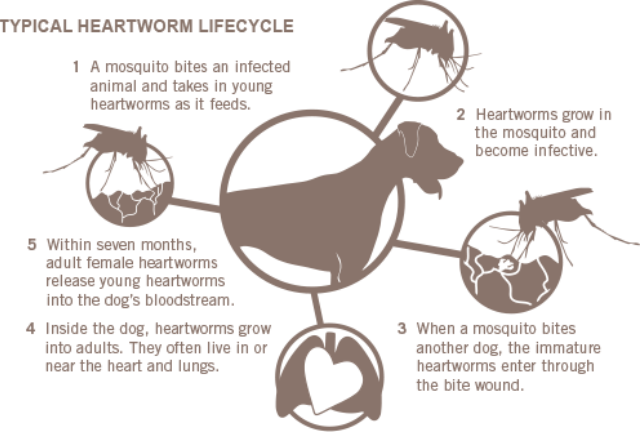Worming
Intestinal Worms
All animals can get worms, pups and kittens more so than adults. We worm pups and kittens every 2 weeks until they are 12 weeks old, then we recommend that you repeat this every 6 months for life. Dogs and cats pick up worms from other animals and by eating insects/flies/fleas etc.
Over the years there has been a significant improvement by local council animal management strategies which means there are fewer stray dogs and cats producing environmental contamination, so your pet is less likely to pick up worms while being exercised than it would have been in previous years.
Most pets do not show any signs of having worms, and if we treat your pet every 6 months, you are unlikely to have any problems associated with Intestinal Worms.
Remember some of the worms that pets get can be passed to humans, this is why its important to always wash your hands after playing with your pets and to keep them up to date with intestinal worming prevention/treatment.

Heartworm
Heartworm is a parasitic worm that lives in the right side of the heart and pulmonary blood vessels in dogs, dingoes and foxes. It hardly ever infects cats or humans.
It can only be transmitted from one dog to another by a mosquito bite – a mosquito bites a dog that has heartworm and sucks up some blood. It then bites another dog and injects some saliva while it feeds including the larval forms of heartworm that then grow into adults over a 5 month period.
The heartworms then clogs up the heart and pulmonary blood vessels, and can lead to heart failure and lung disease in an otherwise healthy pet.
To prevent heartworm we recommend that you start your puppy on prevention at 12 weeks of age, and continue to treat for life.
We cannot eliminate all mozzies- even if your pet rarely goes outside, and we can’t know who the mozzie last bit.
Our recommended Heartworm prevention method is an annual injection (Proheart), but there are other preparations such as monthly chewable ( Heartgard Plus), or a spot-on to put on the coat (Revolution).
If your pet misses their heartworm prevention for more than 3 months, we will start them back on one of these preventions straight away, and then test them 6 months later with a blood sample to make sure they were not carrying the heartworm from when they missed their prevention.
For more information contact us, or book an appointment online
 Nav
Nav
 Book Online
Book Online
